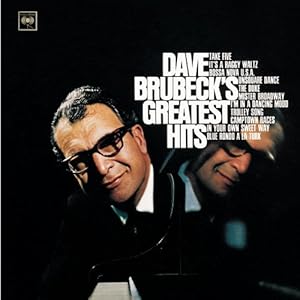Legendary jazz pianist and composer Dave Brubeck passed away on December 5th, one day shy of his 92nd birthday. It's gratifying to me how much Facebook and Twitter chatter has accompanied this event, virtually all praising Brubeck's music and many relaying personal remembrances associated with Mr. Brubeck and his tunes.
To that end, a few remembrances of my own.
My first encounter with Brubeck's music was back in 1972, when I was in 8th grade. I'd been taking drum lessons for three years or so, and my instructor, Jack Wagley, had just got me started on Joe Morello's
New Directions in Rhythm book, which was all about playing in 3/4 and 5/4 time. I was doing fine with the 3/4 studies but not really swinging the 5/4 stuff. So Jack suggested (no, demanded) that I listen to some Dave Brubeck Quartet stuff, "Take Five" specifically. So I called up my dad and asked him to stop in at the local Lyric Records on his way home from work and pick up any Brubeck album with "Take Five" on it. He ended up bringing home a copy of
Dave Brubeck's Greatest Hits, which I immediately put on the old GE hi-fi and played the heck out of. I was hooked.
Well, the very next day after I got that first Brubeck LP, I was leaving my morning choir class when my choir teacher, Mrs. Earnshaw (I know her now as Phyllis Fulford) asked if I'd be interested in getting together some afternoons after school to "play a little Brubeck" with her on piano, band teacher Gene Smith on alto sax, and my ninth-grade friend Brian Siemers on bass. THE VERY NEXT DAY it was. Fortuitous. Of course, I said yes. The four of us put together a fairly good facsimile of the Brubeck Quartet, Mr. Smith had a nice light touch in the Desmond mold, Brian and I locked in the rhythm like we'd been doing it all along, and I even got to throw in my best Morello chops on the requisite "Take Five" drum solo. It was a blast, and we ended up playing "Take Five" at a Choral Club concert later that spring. I don't know who to thank, Phyl or my drum teacher or the unseen hand of fate, but that whole experience got me tuned into jazz in general and Brubeck in particular. And I can still swing the hell out of 5/4, thank you very much.
A little later that year the Brubeck Quartet came to town for an outdoor concert at the Indianapolis Museum of Art, and Phyl and Brian and I snapped up tickets. It wasn't the "classic" Quartet; Desmond, Morello, and Wright were gone, replaced (if my memory serves me correctly) by Gerry Mulligan (bari sax), Alan Dawson (drums), and Jack Six (bass). But the concert was fantastic, and I even got talked into getting Brubeck's autograph for Phyllis, who was too shy or embarrassed or whatever to do it herself. This visit coincided with a clinic by Alan Dawson at Fred's Drums, the big local drum shop of the time, which was another fine learning experience. Heady times.
I listened to Brubeck pretty continuously over the years, but never got another chance to catch him in concert until a couple of years ago, after I'd moved up to the Twin Cities. He was playing with his long-standing current Quartet, with Bobby Militello on sax, Randy Jones on drums, and Michael Moore on bass. Brubeck himself was 89 years old, needed assistance getting to and from the piano, but played just as strongly as he had forty years before. It was a privilege to listen to the man play, a true joy.
And now, two years later, Dave Brubeck has left us. His music, however, remains, and remains a considerable influence on the worlds of both jazz and popular music. Brubeck was a unique pianist, with his dense block chords punctuating the music in unexpected rhythms, while at the same time supporting his sweetly lyrical melodic lines. He was a very intelligent player, applying tons of advanced theory to even the simplest tunes; his own compositions were intricate and thoughtful, things of joy and beauty.
The world remembers Dave Brubeck for "Take Five," and that's fair, even if it wasn't his composition (Paul Desmond wrote it after hearing Joe Morello do some warm ups in five) and even if he didn't have a solo on it. But it was representative of his repertoire, cool and intelligent yet still swinging -- just like the man himself.
Dave Brubeck will be missed, of course, but will be remembered -- and will also be the key to other great memories. Thanks, Mr. Brubeck. You deserve a big time out.
 logo, all songs
from the MP3 version of that album will instantly be delivered to your Amazon
Cloud Player library for FREE.
logo, all songs
from the MP3 version of that album will instantly be delivered to your Amazon
Cloud Player library for FREE.